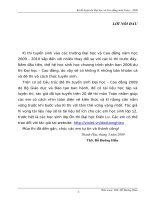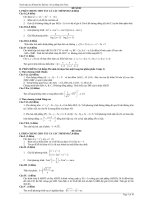Cac de luyen thi
Bạn đang xem bản rút gọn của tài liệu. Xem và tải ngay bản đầy đủ của tài liệu tại đây (120.8 KB, 6 trang )
PRACTICE TEST 1
Mark the letter A, B, C, or D on your answer sheet to indicate the word whose underlined part
differs from the other three in pronunciation in each of the following questions.
Question 1
A. prolong
B. contact
C. conscious
D. common
Question 2
A. signal
B. sign
C. colleague
D. regard
Mark the letter A, B, C, or D on your answer sheet to indicate the word that differs from the other
three in the position of primary stress in each of the following questions.
Question 3
A. individual
B. extinction
C. opposition
D. universal
Question 4
A. facility
B. television
C. benefit
D. consequence
Mark the letter A, B, C, or D on your answer sheet to indicate the underlined part that needs
correction in each of the following questions.
Question 76: The woman of whom the (A) red car is parked (B) in front of (C) the bank is a famous pop
star (D).
Question 77: Commercial letters of credit are (A) often used to financing (B) export (C) trade, but they can
have other uses (D).
Question 78: To stay warm (A) in cold weather, cold-blooded animals must expose itself (B) to a
source(C) of warmth such as direct (D) sunlight.
Mark the letter A, B, C, or D on your answer sheet to indicate the correct answer to each of the
following questions.
Question 8: __________, the young woman was visibly very happy after the birth of her child.
A. Tired although she was
B. She was tired
C. Though tired
D. Despite tired
Question 9: When a country is at war young men are often _________ into the army.
A. forced
B. obliged
C. drafted
D. sent
Question 10. Everybody ________ it for granted that I would pay for the meal, as I was the only one who
would afford to.
A. made
B. put
C. took
D. got
Question 11. In my _______, freedom of the press must be maintained.
A. sight
B. thought
C. view
D. mind
Question 12. Tom said he took ______ golf so that he could meet more interesting people.
A. over
B. on
C. back
D. up
Question 13. To get a passport, you must send in your birth _______ and two photos.
A. certificate
B. license
C. paper
D. card
Question 14. His face looks ______, but I can’t remember his name.
A. similar
B. alike
C. memorial
D. familiar
Question 15. She tries to set __________ an hour a week for practice.
A. about
B. down
C. aside
D. in
Question 16. There’s no _______ to book tickets in advance. There are always plenty of seats.
A. problem
B. matter
C. need
D. demand
Question 17. Our house, which ___________by the river, has a beautiful and modern design.
A. is situating
B. is situated
C. situating
D. situated
Question 18. To everyone’s surprise, Mr. Lee _______ at the Trade Union meeting.
A. turned in
B. turned over
C. turned up
D. turned round
Question 19. On May 6, 1840, Britain released the world’s first postage________, the Penny Black with a
portrait of Queen Victoria on a black background.
A. envelope
B. letter
C. stamp
D. parcel
Mark the letter A, B, C, or D on your answer sheet to indicate the most suitable response to
complete each of the following exchanges.
Question 20: “Do you have the time, please?” - “___________”
A. I'd rather not.
B. Sure. I have plenty of time.
C. No, I haven't. I'm busy.
D. Sorry. I don't have a watch now.
Question 21: "Would you like to meet Mrs. Gale?" - "_________"
A.I don't know where she is living.
B. I'd love to.
C. I find it very interesting.
D. I can make an appointment with her.
Mark the letter A, B, C, or D on your answer sheet to indicate the word(s) CLOSEST in meaning to
the underlined word(s) in each of the following questions.
Question 22. In many cases, consumers are misled if they believe organic foods can maintain health and
provide better nutritional quality than conventional grown food.
A. preserve
B. restore
C. monitor
D. improve
Question 23. In many countries, people who are jobless get unemployment benefit.
A. fee
B. dole
C. pension
D. scholarship
Mark the letter A, B, C, or D on your answer sheet to indicate the word(s) OPPOSITE in meaning to the
underlined word(s) in each of the following questions.
Question 24. The notice was declared such a long time ago that it can't be seen now.
A. is unnoticed
B. is unvisible
C. is visible
D. is blind
Question 25: Any student who neglects his or her homework is unlikely to do well at school.
A. approves of
B. attends to
C. puts off
D. looks for
Mark the letter A, B, C, or D on your answer sheet to indicate the sentence that is closest in
meaning to each of the following questions.
Question 26. If only I had taken his advice.
A. I wish I followed his advice.
B. I regret not having taken his advice.
C. I wish I have taken his advice.
D. I regret not to take his advice.
Question 27. He was at a loss for words.
A. He was puzzled about what to say.
B. He had much to say.
C. He refused to say anything.
D. He had nothing pleasant to say.
Question 28. Don’t believe in him.
A. You shouldn’t count on him.
B. You shouldn’t trust him.
C. You shouldn’t believe what he says.
D. Both A and B are correct.
Mark the letter A, B, C, or D on your answer sheet to indicate the sentence that best combines each
pair of sentences in the following questions.
Question 29: Nam defeated the former champion in three sets. He finally won the inter-school table tennis
championship.
A. Having defeated the former champion in the inter-school table tennis, Nam did not hold the title of
champion.
B. Although Nam defeated the former champion in three sets, he did not win the title of inter-school table
tennis champion.
C. Having defeated the former champion in three sets, Nam won the inter-school table tennis
championship.
D. Being defeated by the former champion, Nam lost the chance to play the final game of inter-school table
tennis champion.
Question 30: Most scientists know him well. However, very few ordinary people have heard of him.
A. He is the only scientist that is not known to the general public.
B. Not only scientists but also the general public know him as a big name.
C. Although he is well known to scientists, he is little known to the general public.
D. Many ordinary people know him better than most scientists do.
Read the following passage and mark the letter A, B, C, or D on your answer sheet to indicate the
correct word or phrase that best fits each of the numbered blanks from 31 to 35.
WHALES
How far would you travel for a good meal? If you were a humpback whale, the answer would be five
thousand miles. These large sea animals travel at least that far from their winter home off the (31)____ of
Columbia to their summer feeding areas off Antarctica. The distance covered by some types of whale is
amazing, especially when you (32) _____ their enormous size. The blue whale is the largest animal that has
ever lived and it can weigh as much as thirty elephants. It (33)____ as no surprise, therefore, to hear that
ancient folk legends tell of sailors (34)_____ these creatures for islands.
The more we find out about whales, the more wonderful they seem. Some species can hold their breath for
more than an hour and dive to a length of over 2000 metres. They use a system of sounds known as echolocation to find the fish they eat and they have further sounds to keep in touch with each other. The noises
they produce can travel hundreds of miles under water. Some species seem to sing complicated songs
which (35) ____ of a number of separate themes, sung in a specific order which can last up to half an hour
or more. If you ever get the chance to see one of these great creatures in the wild, you will understand why
they have inspired so many legends.
Question 31. A. beach
Question 32. A. watch
Question 33. A. gets
Question 34. A. supposing
Question 35. A. consist
B. coast
B. think
B. comes
B. mixing
B. compose
C. seaside
C. consider
C. goes
C. confusing
C. include
D. ground
D. believe
D. seems
D. mistaking
D. involve
Read the following passage and mark the letter A, B, C, or D on your answer sheet to indicate the
correct answer to each of the questions from 36 to 42.
In 776 B.C, the first Olympic Games were held at the foot of Mount Olympus to honor the Greek’s
chief god, Zeus. The warm climate for outdoor activities, the need for preparedness in war, and their
lifestyle caused the Greeks to create competitive sports. Only the elite and military could participate at first,
but later the Games were open to all free Greek males who had no criminal record. The Greeks emphasized
physical fitness and strength in their education of youth. Therefore, contests in running, jumping, discus
and javelin throwing, boxing, and horse and chariot racing were held in individual cities, and the winner
competed every four years at Mount Olympus. Winners were greatly honored by having olive wreaths
placed on their heads and having poems sung about their deeds. Originally, these contests were held as
games of friendship, and any wars in progress were halted to allow the game to take place. They also
helped to strengthen bonds among competitors and the different cities represented. The Greeks attached so
much importance to the Games that they calculated time in four-year cycles called “Olympiads” dating
from 776 B.C. The contests coincided with religious festivities and constituted an all-out effort on the part
of the participants to please the gods. And who disobeyed the rules were dismissed and seriously punished.
These athletes brought shame not only to themselves, but also to the cities they represented.
Question 36. Which of the following is not true?
A. Winners placed olive wreaths on their own heads.
B. The Games were held in Greece every four years.
C. Battles were interrupted to participate in the games.
D. Poems glorified the winner in song.
Question 37. Approximately how many years ago did these games originate?
A. 800 years
B. 1,200 years
C. 2,300 years
D. 2,800 years
Question 38. What conclusion can we draw about the ancient Greek?
A. They are pacifists.
B. They believed athletic events were important.
C. They were very simple. D. They couldn’t count, so they used “Olympiads” for dates.
Question 39. What is the main idea of this passage?
A. Physical fitness was an integral part of the lives of the ancient Greeks.
B. The Greeks severely punished those who did not participate in physical fitness programs.
C. The Greeks had always encouraged everyone to participate in the games.
D. The Greeks had the games coincide with religious festivities so that they could go back to war when
the games were over.
Question 40. The word “deeds” is closest in meaning to _____________.
A. accomplishments
B. ancestors
C. documents
D. property
Question 41. Which of the following was ultimately required of all athletes competing in the Olympics?
A. They must have completed military service.
B. They had to attend special training sessions.
C. They had to be Greek males with no criminal record.
D. They had to be religious.
Question 42. What is an “Olympiads”?
A. The time it took to finish the game.
B. The time between games.
C. The time it took to finish the war.
D. The time it took the athletes to train.
Read the following passage and mark the letter A, B, C, or D on your answer sheet to indicate the
correct answer to each of the questions from 43 to 50.
Centuries ago, man discovered that removing moisture from food helped to preserve it, and that the
easiest way to do this was to expose the food to sun and wind. In this way the North American Indians
produced pemmican (dried meat ground into powder and made into cakes), the Scandinavians made stock
fish and the Arabs dried dates and apricots.
All foods contain water – cabbage and other leaf vegetables contain as much as 93% water, potatoes and
other root vegetables 80%, lean meat 75% and fish anything from 80% to 60% depending on how fatty it
is. If this water is removed, the activity of the bacteria which cause food to bad is checked.
Fruit is sun-dried in Asia Minor, Greece, Spain and other Mediterranean countries, and also in California,
South Africa and Australia. The methods used vary, but in general the fruit is spread out on trays in drying
yards in the hot sun. In order to prevent darkening, pears, peaches and apricots are exposed to the fumes of
burning sulphur before drying. Plums for making prunes, and certain varieties of grapes for making raisins
and currants, are dipped in an alkaline solution in order to crack the skins of the fruit slightly and remove
their wax coating, so increasing the rate of drying.
Nowadays most foods are dried mechanically; the conventional method of such dehydration is to put
food in chambers through which hot air is blown at temperatures of about 110oC at entry to about 45oC at
exit. This is the usual method for drying such things as vegetables, minced meat, and fish.
Liquids such as milk, coffee, tea, soups and eggs may be dried by pouring them over a heated horizontal
steel cylinder or by spraying them into a chamber through which a current of hot air passes. In the first
case, the dried material is scraped off the roller as a thin film which is then broken up into small, though
still relatively coarse flakes. In the second process it falls to the bottom of the chamber as a fine powder.
Where recognizable pieces of meat and vegetables are required, as in soup, the ingredients are dried
separately and then mixed.
Dried foods take up less room and weigh less than the same food packed in cans or frozen, and they do
not need to be stored in special conditions. For these reasons they are invaluable to climbers, explorers and
soldiers in battle, who have little storage space. They are also popular with housewives because it takes so
little time to cook them.
From Practical Faster Reading by Gerald Mosback and Vivien Mosback. CUP
Question 43: What is the main idea of the passage?
A. Water: the main component of food.
B. Advantages of dried foods.
C. Mechanization of drying foods.
D. Different methods of drying foods.
Question 44: The phrase "do this" in the first paragraph mostly means________.
A. moisten foods
B. expose foods to sun and wind
C. produce pemmican
D. remove moisture from foods
Question 45: In the process of drying certain kinds of fruits, sulphur fumes help ________.
A. remove their wax coating
B. kill of bacteria
C. maintain their color
D. crack their skin
Question 46: Nowadays the common method for drying vegetables and minced meat is ________.
A. dipping them in an alkaline solution
B. spreading them out on trays in drying yards
C. putting them in chambers and blowing hot air through
D. pouring them over a heated horizontal steel cylinder
Question 47: The final product of the process of drying liquids that uses the first method will be
________.
A. small flakes
B. fine powder
C. dried soup
D. recognizable pieces
Question 48: Which of the following is NOT mentioned in the passage?
A. People in India began to use drying methods centuries ago.
B. Dried foods have several advantages over canned or frozen foods.
C. Fruit is usually dried by being laid out on trays in the sun.
D. Liquids are not dried in the same way as fruits and vegetables.
Question 49: According to the passage, dried foods are most useful for ________.
A. people who are on the move
B. housewives who have little storage space
C. explores who are underweight
D. soldiers who are not in battle
Question 50: This passage is mainly ________.
A. analytical
B. fictional
C. argumentative
D. informative









